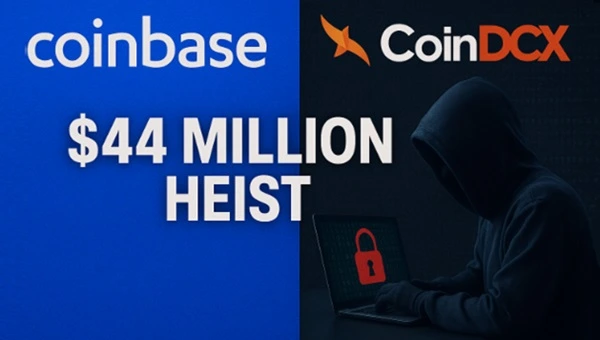India’s crypto market has been operating in regulatory limbo, with authorities tightening compliance requirements and floating stricter rules for digital assets. Against this backdrop, CoinDCX, once hailed as a flagship exchange in India’s Web3 ecosystem, is now facing hard questions about its security architecture and operational resilience.

Strategic Play in a Volatile Market
Yet in the middle of the crisis, attention quietly shifted to an unexpected development: reports that Coinbase had initiated exploratory talks to acquire CoinDCX. The timing was curious. The U.S.-based exchange, already battling regulatory heat at home, appeared to be weighing a high-stakes move into one of Asia’s most volatile crypto jurisdictions.
Coinbase’s global expansion has accelerated over the past year, with new licenses secured in Brazil, Singapore, and the EU. A foothold in India would add scale and strategic depth. CoinDCX, with its millions of Indian customers, strong brand recognition, and local infrastructure, could serve as a fast track for Coinbase’s South Asian ambitions.
The logic is clear. By integrating a local player, Coinbase could circumvent many of the barriers that have slowed foreign exchanges in India. Regulatory navigation would become more manageable, and CoinDCX’s deep roots in India’s fintech landscape would offer an immediate edge. Moreover, the acquisition would strengthen Coinbase’s presence in Asia, where competitors like Binance and OKX have already established dominance.
In the U.S., the Securities and Exchange Commission (SEC) has intensified its focus on crypto listings and staking products. Adding a high-risk international acquisition to the mix could complicate ongoing legal entanglements, especially if Indian regulators raise red flags.
Historical Precedent: Hacks and Consolidation
Still, history shows that major hacks often lead to consolidation. In 2018, Monex Group acquired Japan’s Coincheck following a $530 million hack. That same year, Italy’s Bitgrail shuttered after a security breach, forcing its users to seek recourse through the courts. These moves, while reactive, helped stabilize shaken ecosystems and preserve user bases that might otherwise have evaporated.
In that context, a CoinDCX acquisition could serve a similar function: rebuilding confidence, restoring operational integrity, and giving users hope of continued platform stability. The prospect of being absorbed by a global heavyweight like Coinbase might reassure investors and signal a new chapter for the embattled Indian exchange.
The Denial and Lingering Speculation
Just as the story appeared to be gaining traction, CoinDCX co-founder Sumit Gupta moved to stamp out the chatter. Gupta denied any acquisition talks, saying the company remained independent and was focused entirely on addressing the breach and upgrading its systems.
The denial, however, has done little to silence speculation. In fact, it has only deepened curiosity about what might be happening behind closed doors. In a fast-moving industry known for its secrecy and sudden moves, official denials are rarely the end of the story.
Meanwhile, India’s crypto community is watching closely. For users, the question is whether CoinDCX can rebound on its own or whether a lifeline from abroad is the only viable path forward. For competitors, the possibility of a Coinbase-led resurgence could disrupt existing market dynamics, particularly if the U.S. firm starts rolling out new products or incentives.
As both exchanges continue to operate under intense scrutiny, what happens next could shape not only their respective futures but the trajectory of India’s broader crypto economy.
With regulators tightening their grip, user confidence shaken, and global players eyeing expansion,
the stage is set for a pivotal few months.
He has worked with several companies in the past including Economy Watch, and Milkroad. Finds writing for BitEdge highly satisfying as he gets an opportunity to share his knowledge with a broad community of gamblers.
Nationality
Kenyan
Lives In
Cape Town
University
Kenyatta University and USIU
Degree
Economics, Finance and Journalism


Facts Checked by Will Wood



 Fact checked by
Fact checked by 
 eabungana@gmail.com
eabungana@gmail.com 